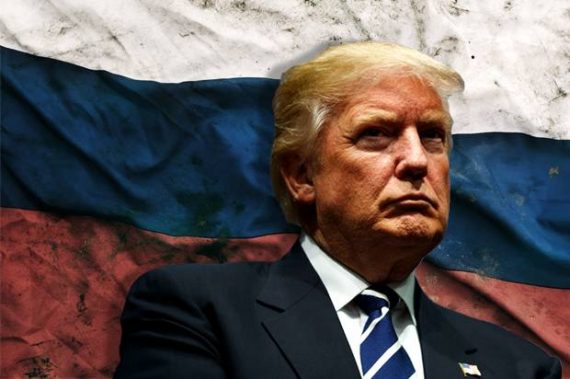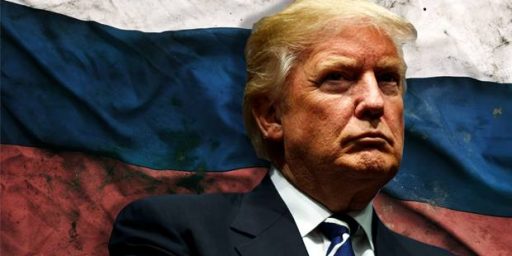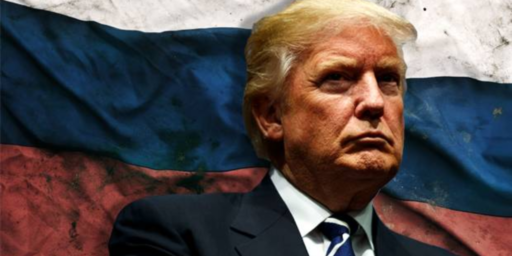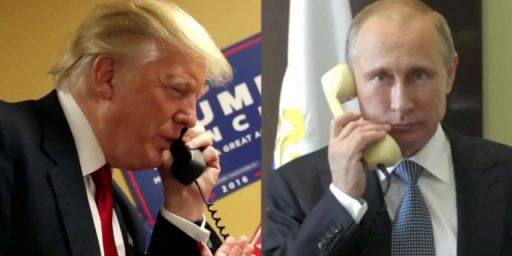Trump Aide Tried To Set Up Meetings With Russian Officials, Report Says
A new report indicates that Trump campaign officials were seeking contact with Russian officials earlier than we thought.
In the latest report on the allegations regarding Russian interference in the 2016 election and contact between the Trump campaign and Russian officials, The Washington Post is reporting that officials inside the Trump campaign sought to set up meetings with Russian officials very early in the campaign’s history:
Three days after Donald Trump named his campaign foreign policy team in March 2016, the youngest of the new advisers sent an email to seven campaign officials with the subject line: “Meeting with Russian Leadership – Including Putin.”
The adviser, George Papadopoulos, offered to set up “a meeting between us and the Russian leadership to discuss US-Russia ties under President Trump,” telling them his Russian contacts welcomed the opportunity, according to internal campaign emails read to The Washington Post.
The proposal sent a ripple of concern through campaign headquarters in Trump Tower. Campaign co-chairman Sam Clovis wrote that he thought NATO allies should be consulted before any plans were made. Another Trump adviser, retired Navy Rear Adm. Charles Kubic, cited legal concerns, including a possible violation of U.S. sanctions against Russia and of the Logan Act, which prohibits U.S. citizens from unauthorized negotiation with foreign governments.
But Papadopoulos, a campaign volunteer with scant foreign policy experience, persisted. Between March and September, the self-described energy consultant sent at least a half-dozen requests for Trump, as he turned from primary candidate to party nominee, or for members of his team to meet with Russian officials. Among those to express concern about the effort was then-campaign chairman Paul Manafort, who rejected in May 2016 a proposal from Papadopoulos for Trump to do so.
The exchanges are among more than 20,000 pages of documents the Trump campaign turned over to congressional committees this month after review by White House and defense lawyers. The selection of Papadopoulos’s emails were read to The Post by a person with access to them. Two other people with access to the emails confirmed the general tone of the exchanges and some specific passages within them.
Papadopoulos emerges from the sample of emails as a new and puzzling figure in the examination of the Trump campaign’s contacts with Russian officials and their proxies during the 2016 election, now the subject of a special-counsel investigation.
Less than a decade out of college, Papadopoulos appeared to hold little sway within the campaign, and it is unclear whether he was acting as an intermediary for the Russian government, although he told campaign officials he was.
While the emails illustrate his eagerness to strengthen the campaign’s connections to the Russian government, Papadopoulos does not spell out in them why it would be in Trump’s interest to do so. His entreaties appear to have generated more concern than excitement within the campaign, which at the time was looking to seal the Republican nomination and take on a heavily favored Hillary Clinton in the general election.
To experts in Russian intelligence gathering, the Papadopoulos chain offers further evidence that Russians were looking for entry points and playing upon connections with lower-level aides to penetrate the 2016 campaign.
Former CIA director John Brennan in May told the House Intelligence Committee that he had seen worrisome evidence of “contacts and interactions” between Russian officials and the Trump campaign, although he offered no specifics.
Steven L. Hall, who retired from the CIA in 2015 after 30 years of managing the agency’s Russia operations, said when told by The Post about the emails: “The bottom line is that there’s no doubt in my mind that the Russian government was casting a wide net when they were looking at the American election. I think they were doing very basic intelligence work: Who’s out there? Who’s willing to play ball? And how can we use them?”
While these initial efforts at contact with and from Russian officials were unsuccessful, it’s worth noting that it was only three months later that there was, in fact, a meeting between Trump campaign officials and someone they believed to be connected to or representing the Russian government. I am referring, of course, to the June 2016 meeting that included Donald Trump Jr., Jared Kushner, and Paul Manafort met with a Russian lawyer who was said to have connections to the Russian government and be in possession of damaging information about Hillary Clinton. Additionally, we already knew that other people close to Trump, including Attorney General Jeff Sessions, had meetings around the same time with the Russian Ambassador to the United States, although Sessions maintains to this day that the meetings were part of his official duties as a Senator and that he did not discuss campaign matters or the election with the Ambassador. That caveat notwithstanding, it does demonstrate the fact that, notwithstanding the initial resistance to reaching out to Russian officials went away in a very short period of time, and that interest in talking to people with ties to the Russian government increased significantly once it was implied that they had information that could be used against Hillary Clinton in the General Election campaign.
These revelations came just a few hours before Trump himself seemed to make an admission regarding Russian interference in the election:
According to report just out, President Obama knew about Russian interference 3 years ago but he didn’t want to anger Russia!
— Donald J. Trump (@realDonaldTrump) August 15, 2017
As I noted in my own Tweet, this seems like a significant change from what Trump has said regarding the Russia investigation for months now:
So now you admit there was Russian interference in the election and that it’s not #FakeNews? https://t.co/tuecWe2KeL
— Doug Mataconis (@dmataconis) August 15, 2017
I don’t expect Trump to answer that question, of course, but it’s worth noting that this is one of the first times, if not the first time, that Trump has said that there was, in fact, Russian interference in the election. Previously, he has claimed that there was no such interference and that any allegation or claim to the contrary was “Fake News” being spread by his political enemies and news outlets such as CNN and MSNBC. It’s also worth noting that this Washington Post report flies in the face of denials from current and former Trump officials who have repeatedly denied the existence of any such contact. Former campaign manager Corey Lewandowski, for example, said that nobody in the Trump campaign had any contact at all with Russian officials or persons representing the Russian Government. We know now that to be a lie, of course, and the question remains to be answered is what other contacts there were that we don’t already know about. This is what the House and Senate investigations, and Robert Mueller’s investigation, will no doubt be focused on.





I think this is the key take-away. And then of course, as you state, the campaign leadership did eventually meet with Russian operatives. Shortly thereafter the wikileaks stuff started. And once in office Trump started trying to ease Russian sanctions. So we have already seen opportunity, motive, and direct evidence of quid pro quo.
Trump has tweeted before about Obama knowing about Russian interference and doing nothing.
https://twitter.com/realdonaldtrump/status/878413313188802560?lang=en
We can argue about whether he did enough, but that he did nothing is a bald-faced lie.
So this tweet isn’t really new, just one more contradiction in Trumps logic system, or lack thereof.
Collusion, lies, contradictions. Hallmarks of the Trump administration.
Shrodingers Russian Meddling; it didn’t happen, it’s fake news…but it’s Obama’s fault.
“This is what the House and Senate investigations, and Robert Mueller’s investigation, will no doubt be focused on.”
Mueller’s investigation, yes, at least in part. The Senate’s, likely.
The House’s investigation seems more focused on digging up dirt on Democrats than any potential wrong-doing by the Trump campaign.
It could be that this shows the Trump campaign rejecting advances from Russia, or it could be that their reaction to Papadopoulos’ was, ‘Amatuer. I want to talk to Russians, I’ve got Kislyak on speed dial.’